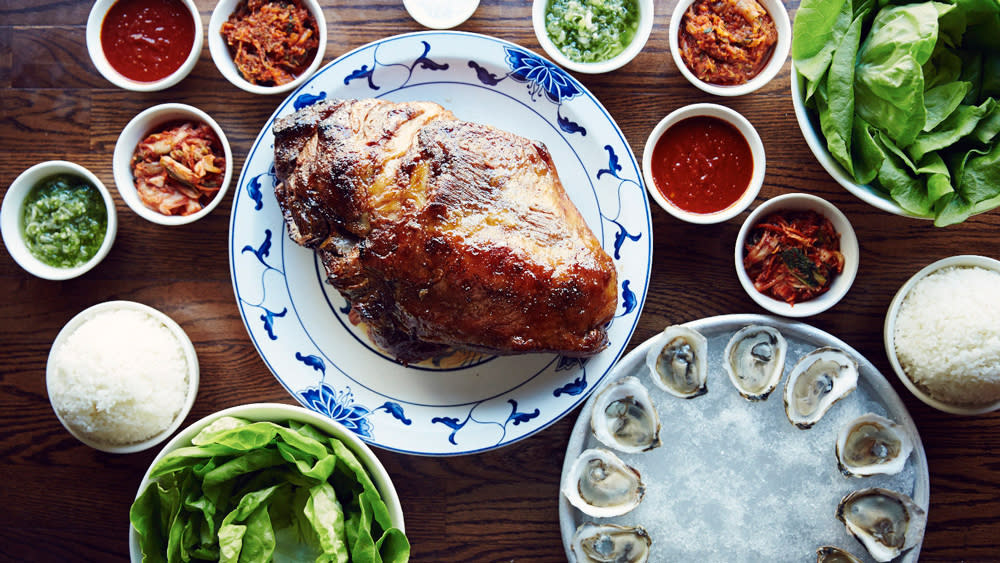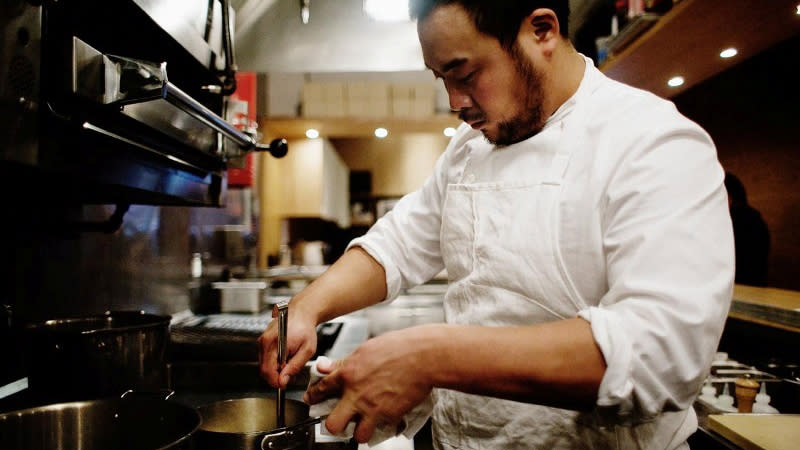David Chang’s Game-Changing Momofuku Ssäm Bar Is Closing This Month, Ending an Era of New York Dining

- Oops!Something went wrong.Please try again later.
If you write the book of dining in the 21st century, New York’s Momofuku Ssäm Bar has to be in it. But by the end of this month we’ll already know how the restaurant’s chapter ends.
Ssäm Bar announced on Instagram that September 30 would be the restaurant’s last day, shuttering on Pier 17 in Lower Manhattan. While the post said that David Chang’s groundbreaking spot would cease operations after 17 years, this is the second closing in its history.
More from Robb Report
This 19th-Century New York City Townhouse, Listed for $15 Million, Sits Atop a 33-Foot Indoor Pool
This $6.3 Million Manhattan Penthouse Pairs Traditional Glamor With Glittery Views
Fewer Restaurants Are Opening With Big-Name Chefs in the Kitchen. Here's Why.
In May 2020, after just a few months of pandemic-inflicted hardship, Momofuku took action to stem the bleeding in the company. Despite being a profitable restaurant before the Covid-19 crisis hit, Momofuku announced Ssäm Bar would leave its East Village location and merge with Bar Wayō in Manhattan’s South Street Seaport. Momofuku also permanently closed its Italian concept Nishi in Chelsea, as well as its restaurant in Washington, D.C. Despite keeping the Ssäm name alive, the new iteration was in a glossy new construction instead of a charming nook in the East Village where it began.
“I can’t speak to the business factors behind the decision, but culturally and culinarily, the new space never regained the cutting-edge relevance or raffish magic of the old digs,” wrote Ryan Sutton, former restaurant critic for Eater NY, in his newsletter the Lo Times. “The new Ssam Bar felt like yet another expensive share plates spot—a trend it helped fuel—in a city with no shortage of them.”
When Ssäm opened it 2006 it was a shot across the bow of New York City’s elite dining scene, mostly centered in Midtown Manhattan. Chang opening Noodle Bar and Ssäm was akin to punk emerging nearby in the 1970s: Chang stripped everything away to reveal what was really important. Gone were the tablecloths and stuffiness of fine dining, but the quality of the food remained. His high-low mix became a model chefs followed for years to come. And he helped bring Korean cuisine to the fore in America, while also incorporating flavors from across Asia in the restaurant’s dishes.

“It feels very inclusive. Momofuku is accessible in terms of price points. It’s accessible in terms of appealing to different age groups of people who get what the food is about,” Corey Lee of Benu in San Francisco told Robb Report in 2019. The Michelin three-starred chef, like many of his peers, considered Momofuku among the restaurants that defined dining in the 2010s. “Those are the key things people were looking for this last decade—for restaurants to be more inclusive and accessible. It’s a very different kind of restaurant than the ones we’d tended to talk about in decades prior.”
At Ssäm Bar, Chang—who had previously worked at Café Boulud and Tom Colicchio’s Craft—had his own place to challenge tradition in a way that became his signature. “My initial reaction is to almost be like a bulldozer just to see what happens, because that’s just how I am as a person, and then I reflect about what I might have broken after the fact,” Chang previously told Robb Report.
Momofuku Ssäm was such a sensation it became a larger company that would eventually expand to L.A., D.C., Toronto, Australia, and Las Vegas. Since the pandemic, the company has receded, closing multiple locations, while leaning more into its consumer-packaged goods like its chili crunch and instant noodles. Chang himself has stepped away from the kitchen day-to-day with a focus on media projects like his podcast and streaming series.
The pandemic mostly ended that chef-driven era of plucky little New York restaurants punching well above their weight, but the closing of Ssäm is further proof that time in dining has largely passed.
Best of Robb Report
Why a Heritage Turkey Is the Best Thanksgiving Bird—and How to Get One
The 10 Best Wines to Pair With Steak, From Cabernet to Malbec
Sign up for Robb Report's Newsletter. For the latest news, follow us on Facebook, Twitter, and Instagram.

